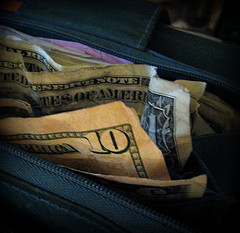Play. I think we all remember the excitement and thrill that came from even the most basic recreational activities as a child. But what many parents do not acknowledge is the many benefits that play can have on our child besides just being fun.
It has been widely proven that play helps to stimulate children’s cognitive growth and is a key factor in their social development. We have all seen the keen fascination when a toddler puts the banana to their ear to call Nanny. This is an example of symbolic play showing that they have recognised the function of a particular object and they are now trying to reiterate it to the best of their ability.
Money orientated games can be incorporated into children’s play throughout their development stages. By no means is this to suggest the the use of money as a toy but by using ‘pretend money’ in a range of different role plays and representational games, you could help your child to understand the functions and values that money possesses.
Play-shopping
A childhood classic with a twist. Historically, shopping games usually involve a roleplay between shopkeeper and a customer with pretend groceries exchanged for pretend monies often stored in a pretend cash register. The game, a favourite to many young children, is a fun activity often with the aim of helping your child to differentiate between types of fruits and vegetables.
However this game can be easily adapted for older children in order to help enhance their awareness of monetary value. Give your child a ‘budget’ of a round figure of pretend money, together you can count out the amount that they have, getting them to count it back into your hand to reiterate understanding.
Display the selection of groceries on a table, each with a price tag affixed with a clearly legible number representing the price value – it is probably best to keep these to simple round numbers. You can then assume the ‘shopkeeper’ responsibilities.
Ask your child if there is anything that they would like to purchase and encourage them to do calculations themselves. For example, if their budget was 5 coins and a banana costs 2 coins, ask them how much they will have left if they purchase the banana and work this out together. If your child wishes to purchase a number of items, try and encourage them to add up what the total cost will be and work out if it is affordable to their budget. You may also wish to swap roles allowing them the opportunity to do further calculations.
The Benefits For Your Child
More than being a simple mathematical exercise, this is a great way of getting your child used to the importance of managing budgets and making decisions about what is affordable and what is not. Basic money management skills are likely to be enhanced as if played regularly your child will familiarise themselves with handling a set amount of money rather than believing that it is an endless entity.
There are a number of money games you can play with your child – from ‘shops’ and ‘banks’ to help them deal with budgets, understand the value of money and savings, to matching games with different coins and notes to enhance their awareness of the different formations which money comes in. Play is one of the most fundamental aspects of a child’s development so why not make it meaningful?
This post is written by John Hughes who is the resident blogger at www.independentfinancialadvisor.co.uk, a UK based site that provides access to financial information and advisors as well as debt advice charities for those struggling with their debts.
Earnest Parenting: help for parents who want to teach their kids about money.
Image courtesy of elycefeliz via Creative Commons license, some rights reserved.



it’s a wonderful article, please continue post the interesting writing! thank you.
Such an informative piece.
I think its really a great idea, I wonder if my parent does that when I was a child.
Hope I can apply it when I have my own family/
Barbie